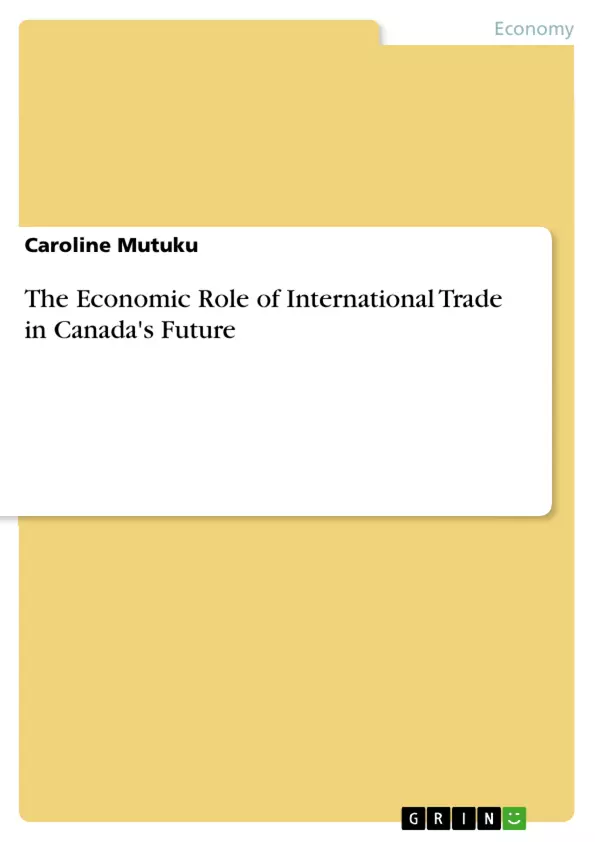In the past decade, the Canadian economy experienced stagnation owing to the existence of unfavorable economic trends in the regional and global economy. It is argued that Canadian economy slipped into a recession because of the challenges faced in building its competitiveness in the international trade network. For instance, Canada has been relying on regional trade, especially with the United States which accounts for the highest portion of international exports, and this aspect is linked to the crippling of the Canadian economy. Therefore, internationalization of trade activities appears to be one of the most reliable approaches for aligning the country’s economy with the 21st century global economy. This approach will enable the country to increase its export levels which will, in turn, increase the Gross Domestic Product of Canada. This is probably why Laurin (2013) remarks “There is a growing perception that Canadian businesses need to turn their attention to overseas markets and shift their business strategies to adapt a new global environment’. As such, the current approach by Canadian premiers to establish trade agreements with international trade partners seem to be an amicable answer to economic tantrums in the Canadian economy. The new approach bears significant economic roles in the Canadian economic prospects in the future. According to the Council of the Federation, it is apparent that “strengthening Canada’s trade and investment linkages with the global economy will mean addressing challenges and taking advantage of new opportunities”. This aspect is reaffirmed by Passaris (2013) who observes “International trade is both the heartbeat and the lifeblood of the Canadian economy. In fact, international trade has empowered Canada to side-step economic theory”.Therefore, this paper will give an overview on the economic role of international trade in Canada’s future.
Inhaltsverzeichnis (Table of Contents)
- The Economic Role of International Trade in Canada's Future
- The Economic Importance of International Trade
- Historical Perspective on Canada's International Trade
- Canada's Trade with the United States
- Trade Diversification and the Importance of Value-Added Products
- The EU Opportunity and the Future of Canadian Trade
- Canada's Expanding Trade Network
Zielsetzung und Themenschwerpunkte (Objectives and Key Themes)
This paper examines the economic role of international trade in shaping Canada's future, highlighting the historical significance of trade in the country's development and exploring the potential of expanded trade networks for economic growth.
- The importance of international trade to Canada's GDP and economic success.
- The historical evolution of Canada's trade relationships, particularly with the United States and the impact of free trade agreements.
- The need for diversification of trade partners and exports beyond natural resources.
- The significance of the EU-Canada trade agreement for expanding trade opportunities and reducing reliance on the US market.
- The potential of new trade partnerships with countries like China, India, and Africa for future economic growth.
Zusammenfassung der Kapitel (Chapter Summaries)
- This paper begins by highlighting the critical role of international trade in Canada's economy. The author emphasizes the historical significance of trade in driving Canada's economic development, citing the "Staples Thesis" and Canada's historical trade relationships with Britain and the United States.
- The paper then focuses on Canada's trade with the United States, the country's most significant trade partner. The author discusses the benefits of the Free Trade Agreement and NAFTA, while also addressing the challenges of Canada's reliance on the US market for its exports. It emphasizes the need to diversify export products beyond natural resources to increase value-added exports.
- The paper then examines the EU-Canada trade agreement as a key opportunity for Canada to diversify its trade network and reduce its dependence on the US market. The author highlights the potential for increased exports to the EU market and the positive implications for economic growth and development.
Schlüsselwörter (Keywords)
The paper explores key concepts such as international trade, economic development, free trade agreements, diversification of exports, value-added products, the EU-Canada trade agreement, and the role of new trade partners like China, India, and Africa in shaping Canada's economic future.
Frequently Asked Questions
What is the main economic challenge for Canada mentioned in the paper?
The paper highlights Canada's heavy reliance on regional trade with the United States and the need to diversify into global markets to avoid economic stagnation.
What is the "Staples Thesis"?
It is a theory explaining Canada's economic development through the export of raw natural resources (staples) to more advanced economies like Britain and the US.
How important is international trade to the Canadian GDP?
International trade is described as the "heartbeat and lifeblood" of the Canadian economy, essential for increasing export levels and overall GDP growth.
Why is the EU-Canada trade agreement significant?
It represents a major opportunity for Canada to reduce its dependence on the US market and expand its trade network into a large, developed economic zone.
Which emerging markets are considered for Canada's future trade?
The paper identifies China, India, and various African nations as key potential partners for future economic growth and diversification.
What are "value-added products" in the context of Canadian exports?
These are products that have been processed or manufactured beyond their raw state, offering higher economic value than simple natural resource exports.
- Citation du texte
- Caroline Mutuku (Auteur), 2018, The Economic Role of International Trade in Canada's Future, Munich, GRIN Verlag, https://www.grin.com/document/432468



